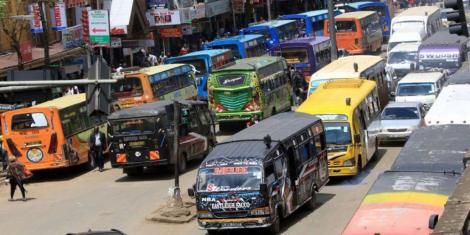Many Kenyans commute everyday, to and from their homes and workplaces among other locations.
Unfortunately, most of them can narrate harrowing tales experienced at the hands of matatu crews.
A vast majority of matatu drivers and conductors do honest work, but rogue elements have tarnished the industry’s reputation. Kamageras, young touts who hang around termini, are responsible for much of the menace.
In recent months, for instance, there have been several complaints of matatu conductors sexually harassing female passengers, and multiple reports of matatu robberies.
Kenyans.co.ke reached out to Matatu Owners Association Chairman Simon Kimutai seeking to find out if the union was aware of the situation, and if any programmes had been initiated to change things.

On the issue of conductors harassing passengers physically and verbally, Kimutai stated that it was a criminal matter.
He maintained, however, that it was up to matatu owners to ensure individual culprits face the full force of the law.
“I think these are individual criminal issues and they should be handled as such.
“Criminal activities including harassment and robbery must be dealt with, so I would advice affected passengers to report to the police and other authorities,” Kimutai stated.
Several women have complained about cat calls, being indecently touched, insulted and harassed at matatu stages.
Cases of matatu crews being involved in robberies have also been reported, with routes including Mombasa Road, Westlands and Thika Road the most notorious.
In such cases, the crews are usually in on a plan alongside thugs who initiate robberies in the middle of trips.
Linda*, who was a victim of a robbery while heading to the Nairobi CBD from Westlands in March recalled how it happened.
“We got into a 14-seater matatu coming from Kangemi. It was almost full, I didn’t realise that three of the other passengers were part of a gang.
“We stopped under a footbridge and one of them brandished a gun, then they pulled out a black bag and started collecting phones, wallets and cash,” she recounted.
She observed that they seemed to be working with the matatu crew as the passengers were dropped off at a footbridge before the driver and conductor left with the thugs.
The unruly nature of the industry has seen such cases become all-too common.
Other pet peeves that annoy passengers include drunk and violent matatu crews.
Kamageras also sometimes decide to abruptly end journeys before passengers get to their promised destinations. Protests are often met with insults.
In some cases, they use decoy passengers to convince passengers that the vehicles are full when the reality is different. Known as kupiga seti, the practice angers many commuters and has led some to storm out of matatus in protest.
Others are frustrated by crews who sometimes switch drivers in the middle of rides, with the drivers sometimes unqualified.
Fights at matatu termini as well as poorly maintained vehicles add to the list of factors that make commuting a living hell.
Some crews openly flout overloading regulations and ignore protests from passengers.
Efforts by government agencies to rein in on the sector have been futile in past years.
The most recent attempt, by the Nairobi Metropolitan Services (NMS) aims to have all matatus out of the Central Business District.
A notice issued by NMS gave public service vehicles until November to cease operating in the CBD.
It remains to be seen whether the attempt to de-congest the city will be successful, after similar efforts by the Nairobi County Government failed spectacularly.
SOURCE: kenyans.co.ke







![Top 20 Used Cars to Avoid Buying in Kenya – [PHOTOS]](../../../blog/wp-content/uploads/2013/11/top-used-unreliable-cars-to-avoid2-80x60.jpg)

![Here are some of the best tuned cars in kenya by state of the art garages [PHOTOS]](../../../blog/wp-content/uploads/2013/11/29402_10151301757042065_340470732_n-e1384498044289.jpg)


![Top 20 Used Cars to Avoid Buying in Kenya – [PHOTOS]](../../../blog/wp-content/uploads/2013/11/top-used-unreliable-cars-to-avoid2-100x70.jpg)





